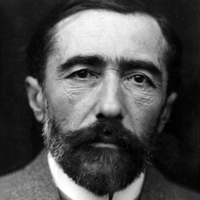Exploration of Evil in Heart of Darkness
Conrad's Heart of Darkness says that everybody has within oneself vulnerability, fragility, weakness and strong fear of being deviated from the essential norms and values. All of us possess within ourselves basic evils. In our day to day normal life this basic hidden evil doesn't emerge strongly and overwhelmingly. But when we enter into that zone, which fires our evils, these evils becomes insurmountable and unconquerable.

Joseph Conrad (1857-1924)
These evils becomes so threatening that they can claim our lives. For example, greed and lust for power and prosperity is invisibly hidden in the innermost part of our life. At the normal state of our life we are not aware of how life threatening they are. But the moment we enter into the atmosphere of temptation we succumbs to the temptation of evils if we have no substance to prevent.
In the novel, there is a unique and pretty extraordinary genius Kurtz. He is a superb European. He represents a highly refined civilized, European, moral self. Amidst the enchanting glow and glamour of his civilized personality all basic evils remained unknown. But as soon as Kurtz landed on the soil of Congo, his civilized personality and 'self' began to dwindle and disintegrate. He saw the prospect of exploiting ivory. He happened to see lots of economic resources in the Congo. He found those people incapable of self-governance. So in Kurtz's mind the ambitious desire to rule the Africans in Congo developed. Having seen lots of ivory, Kurtz's greed soared uncontrollably. In the name of dominating the natives, he became more barbaric than the natives. When Kurtz came to stand face to face with savagery, with savage people, with savage culture, he ought to have controlled his moral self. He must have curbed his lust for those things which are by nature tempting and destructive. But Kurtz gave in for power, material gain and for the beauty of brutalities. His civilized 'self' became so torn that he became the avatar of the natives. He was so engulfed by barbarism that he began to say, 'Exterminate all the brutes'. One step ahead, he becomes so cruel that he was ready to shoot his own bosom friend just for the sake of a small piece of ivory. He was so obsessed that he rapaciously exploited Congo.
His evils cropped up and mushroomed panoramically. He became so sexual that he forgot about his European girlfriend and began to enjoy with an African woman. So it seems that Kurtz's evils increased by leaps and bounds as he came in touch with evil- stimulating outer atmosphere. But like Kurtz, Marlow too had reached Congo. But unlike Kurtz, Marlow kept himself intact amidst the enticing climate of evil. Hence the novel asserts that by exploring the outer world of evil the explorer happen to explore his own inner world of evil. Whichever evil you explore, evil is evil and the elements explored remains evil. Hence Conrad's The Heart of Darkness is an exploration of evil.
Joseph Conrad ridicules the hollowness of the Western European civilization. European civilization puts forward, several tales claims. Western civilization trumpets countess slogans like "Universal Culture", Universal Civilization and The White man's burden. But all of its claims and slogans sound somewhat hollow and empty. The veneer (Mantle) of the European civilization, at the surface, seems gorgeous and glamorous. Nobody succeeds in protecting oneself from being tempted by the gorgeous veil and the veneer of the European Civilization. Its outer appearance is so enticing and hoodwinking that we could not help falling in love with it. In addition, the European civilization claims more than what it is capable. It claims to give more than what it is able to give in reality. It tends to play the game of what the famous post-colonial critic Gayatri Spivak called 'Othering'. It is artistically boastful of its innate superiority.
According to Joseph Conrad the Western civilization is worrisomely fragile and anxiously breakable. Its claims and slogans are empty and dangerous hollow. Its basic context lacks a sense of profundity when Kurtz came in the face of confrontation with Congo, the symbol of Barbarism, an antithesis of civilization; Kurtz began to show his hidden barbaric self. His unrestrained greed just increased unbelievably. His civilized self didn't moderate and subdue the sudden emergence of the barbaric self. As Kurtz's living in Congo continued he gradually changed into the most cruel and exploitative. Had the western civilization been as strong as it was told, Kurtz should not have degenerated into the lusty, licentious, cruel and exploitative figure. Not only Kurtz, but the group of pilgrims who were on Christianization mission turned out to be exploitative figure. Their so called mission of Christianization in Congo was a mask behind which the ghost of economic exploitation dances joyously. Kurtz's much- boasted mission to civilize the African native is a hollow white man's burden. The real target was ivory. The outer face of the European civilization is tantalizing. But inwardly it is fragile and breakable. It topples down consequent upon its contact with barbarism. Hence, to dramatize the fragility of the veil and veneer of the Western Europe Civilization is the powerful and prominent theme.
Literary Spotlight
Introduction of Heart of Darkness
Kurtz's fall in Heart of Darkness
Relation between Colonizer and Colonized
Symbolism of Light and Darkness in Heart of Darkness
Heart of Darkness is Essentially a Journey Within
Use of Narrative Technique in Heart of Darkness
Use of Irony in Heart of Darkness
Significance of the Title Heart of Darkness
 |
bachelorandmaster.com |